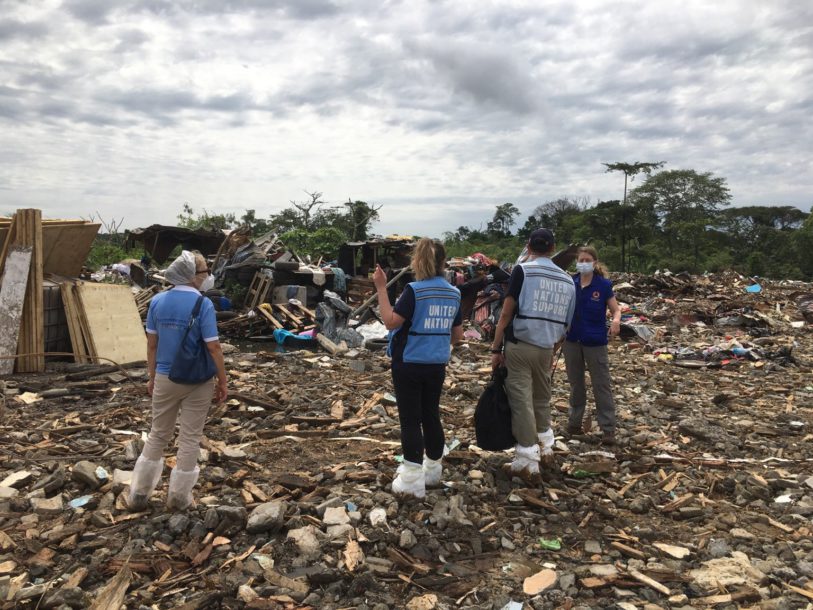Executive Summary
On 7 March 2021, a series of explosions occurred at the armory of the Nkuantoma gendarmerie and military barracks in the city of Bata, the economic capital of Equatorial Guinea. The explosions appear to have resulted from the detonation of ammonium nitrate stored in a civilian storage of explosives for mining purposes, which led to the collapse of military barracks near the site, resulting in further explosions of grenades and ammunition and leading to the spreading of unexploded ordnances across the city. The official death toll stands at 107 people, with more than 700 people injured. Out of a total population of about 310,000, it is estimated that 130,000 people were exposed to the explosions, with 19,000 affected and 8,000 in need of humanitarian assistance. The site where the explosions occurred was totally destroyed as well as houses and vegetation up to 800m from the blast epicenter.
Key environmental concerns in the aftermath of the blasts included: i) detonation risk of unexploded ordnance (UXO) and consecutive contamination; ii) possible water and soil contamination through the outwash of ammunition left overs; iii) the risk of collapsing houses; iv) visible contaminants like the orange powder of the dangerous explosive RDX (Iso calledcyc ionite), barrels with petroleum products and burned cars.
In response to a request for international assistance from the UN Resident Coordinator (RC/RC Office) in-country and the government, a United Nations Disaster Assessment and Coordination (UNDAC) team of 16 was deployed to support on coordination, assessments, environmental information management and humanitarian financing. The mission lasted three weeks, from 12 March to 2 April, and was led by the UNEP/OCHA Joint Environment Unit.
The main objective of the overall mission was to asses the overall situation, with a focus on urgent humanitarian needs; to conduct rapid environmental assessments to identify direct and possible secondary environmental impacts and advise on mitigation measures, with a focus on acute, life-threatening risks; to provide coordination support to the government; to identify key elements that should be addressed in the immediate humanitarian response phase to ensure smooth transition into recovery; to coordinate needs assessments and ensure continued communication with RC/RCO, national authorities and other actors to minimize duplication of efforts; to support on information management and reporting; to ensure continuous information sharing and communication of outputs of the response, under the leadership of the RC/RCO; to provide the government and the RC/UN Country Team with short-term, medium-term and long-term recommendations in the above-identified areas.
The mission outcomes showed that environment was mainstreamed across all lines of action, notably: i) support was provided to advise on acute, life-threatening risks as a result of the explosions, including in terms of air, soil and water contamination; ii) advice has been extended on disaster waste management planning to ensure that safety and security considerations were taken into account; iii) environment was anchored to humanitarian needs assessments to promote a more sustainable and resilient response, and iv) environment was mainstreamed in the appeal across all sectors.
